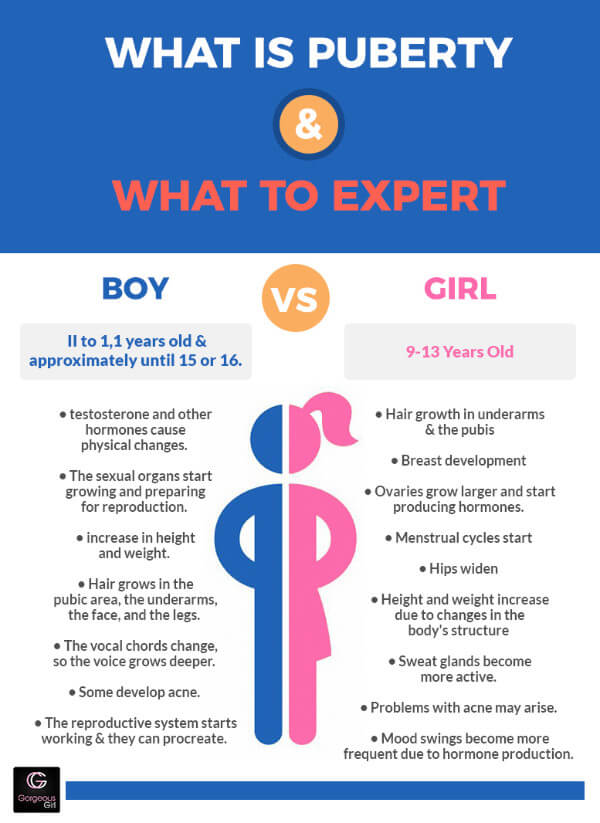Puberty is a huge turning point in the lives of young women—it is a time of great changes and growth. These changes don’t immediately happen all at once, and can take several months to several years. Puberty is the phase when a person starts to shift from child to adult, and for the girls at this point, their bodies develop the ability to have a baby.
What Causes Puberty to Start
Hormones, chemicals produced naturally by the body, begin to make changes. These hormones also trigger ovaries to release other hormones. Together, all these hormones will create changes to the body during puberty.
When Will Puberty Start
There is no specific age when puberty will happen. It varies for every individual. Girls usually start experiencing these changes between the ages of 8-13, but some may begin earlier or later.
What are the Physical Changes During Puberty
The two main hormones in girls are oestrogen and progesterone, and these are responsible for making changes in the body during puberty.

Breasts
“Buds” are the first sign of developing breasts in girls, which form under the nipple. They may be itchy or tender, and may not even be the same size. Breasts may have different sizes and grow at different rates. It’s common for one to appear larger than the other. The areola (dark area around the nipples) also expands.
Body Hair
Hair will start growing around the genitals, under the arms, and on the legs and arms.
Genitals and Reproductive Organ
Oestrogen helps the vagina, uterus, and fallopian tubes to grow and develop. The vulva also starts to be more noticeable. A thorough guide to the female reproductive system is available here.
Waist, Hips, and Buttocks
Hormones also affects how the body stores fat. This will cause the waist, hips, and buttocks to be more defined.
Height
The body grows taller, heavier, and stronger during puberty. The highest growth rate may cause some girls to grow up to 3.2 inches taller every year until puberty ends.
Oily Skin and Acne
Hormones are the primary causes of oily skin and acne. Oil tends to build up on the skin and clog pores, which may result to acne breakouts on the face, back, or chest for some. Girls who have a family history of acne will most likely experience more acne breakouts.
Washing regularly with mild soap may help ease acne breakouts on the affected areas. If it’s severe and too bothersome, parents may consult their child’s pediatrician or dermatologist. The doctor may recommend appropriate creams and ointments to control the breakouts.
Increased Sweating
Sweat glands also grow larger during puberty, which will make girls sweat more. Body odor starts to become a problem at this stage. Good hygiene practices are crucial in preventing body odor, such as using deodorant, wiping off sweat, and regularly taking a shower especially after engaging in physical activities.
Menstruation
Experiencing the first menstrual period is a significant part of puberty. It means that the female body can now make a baby, and that a lot of other changes are happening throughout the month. A lot of women consider their periods as a good indication that their bodies are healthy and working properly.
Periods are induced by hormones, which signal the ovaries to release one egg cell every month. During sexual intercourse, the egg cell can be fertilized by a male’s sperm cell, attach to the lining of the uterus (endometrium), and develop into a baby. If the egg cell was not fertilized, it will be shed out during period along with the built-up lining of the uterus—this is part of the menstrual cycle, and this cycle is what makes it possible for a woman to have a baby.
Periods can be light, heavy, or in between. The menstrual blood can also have different shades of red, ranging from light to dark, and sometimes containing dark clumps—all of these are normal. Periods usually last between three to five days, and may be heavy on the first or second day, then decrease in the latter days. Hygiene is very important during periods since it’s still a new experience for girls.
Having periods that last shorter or last up to seven days is normal, as well as having varying lengths every month, especially during the first years. At first, periods may not yet be regular. One month can have two periods, or none at all. Sometimes it can also last for just a couple of days, or as long as a week. Periods will eventually be regular as girls get older.
Other Changes During Puberty
Puberty also changes the young teens’ minds, not just their bodies. Fluctuating hormones and a developing brain along with the body cause changes to the mind and emotions. Other changes will be linked to social pressures—the demands of school, the pressure to fit in, and worries about how they look.
Mood Swings
Emotions may be stronger and reach extremes in a minute—a teen may feel on top of the world now, then down in the dumps all of a sudden. Feeling miserable can be difficult, and talking with parents or other trusted adults can be helpful for getting support and encouragement.
Sexual Thoughts and Urges
Having more sexual thoughts and urges may also be part of puberty. It’s likely that girls and boys begin feeling sexually or romantically attracted to the opposite sex, the same sex, or to both. Some teens may also feel turned on (horny) often. These feelings probably won’t be as strong as they approach adulthood. Some teens masturbate to release their sexual feelings or be acquainted with their sexuality. Others just wait for the feelings to pass. Masturbating in private is normal for both girls and boys—this is also a great way to understand their bodies better before they enter into sexual relationships later in their lives.
Puberty can be very confusing, and coping with all the changes can be complicated. Changing moods and seemingly uncontrollable emotions are all part of growing up. Puberty is experienced by everyone, and talking to a trusted adult can help sort out feelings.
This major stage in life can be stressful, but it’s also a great time for teens to figure out who they are, what they care about, and how to value and respect who they are.
Sources:
https://www.girlshealth.gov/body/puberty/changes%20mind.html
https://www.plannedparenthood.org/teens/my%20body/puberty.html
https://www.girlshealth.gov/body/period/index.html
https://www.familyplanning.org.nz/advice/understand-your-body/changes-at-puberty



